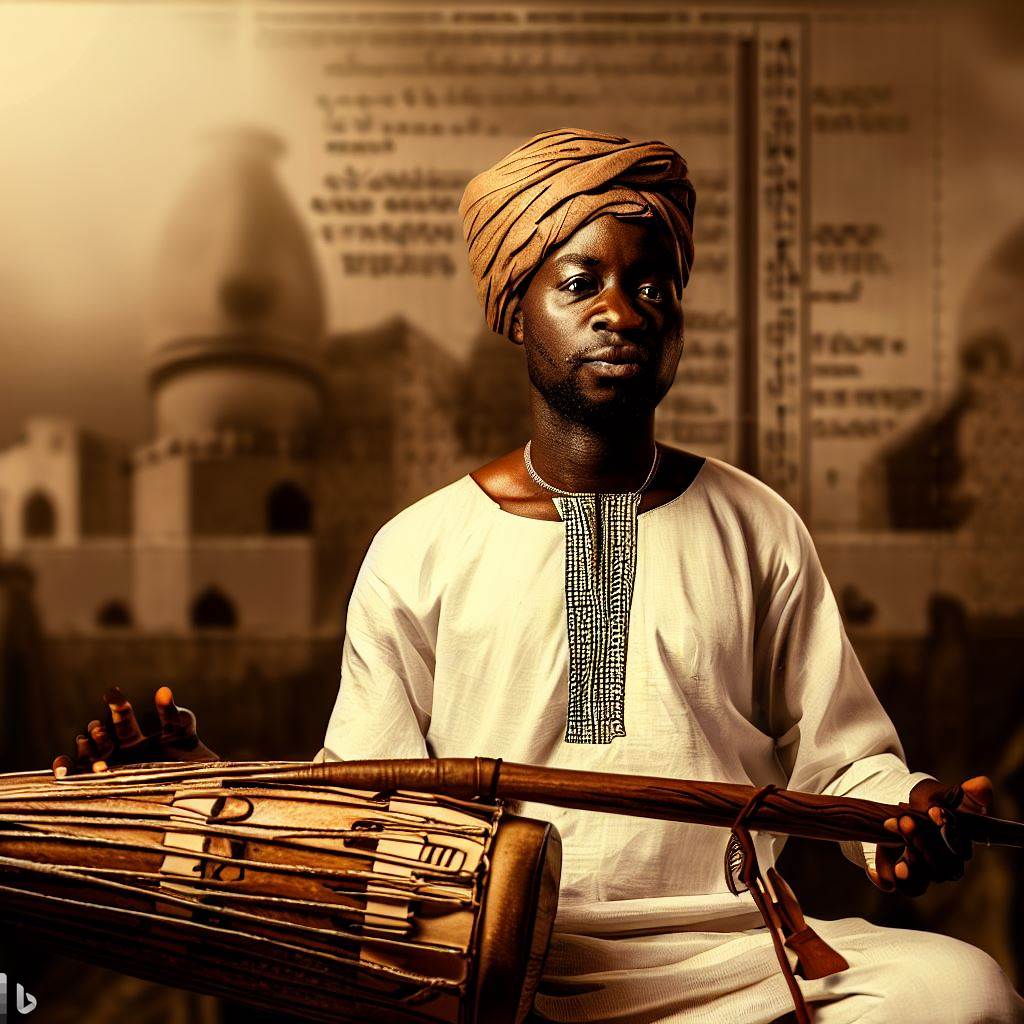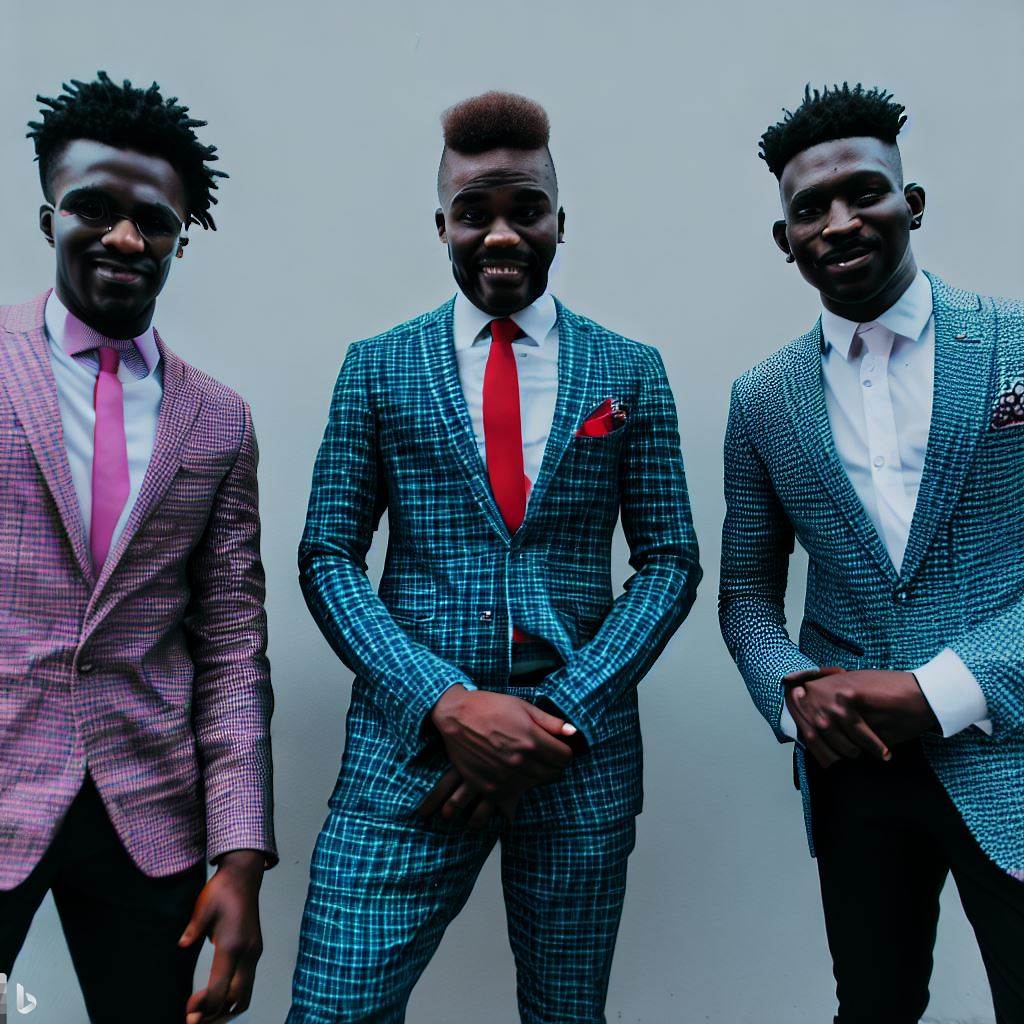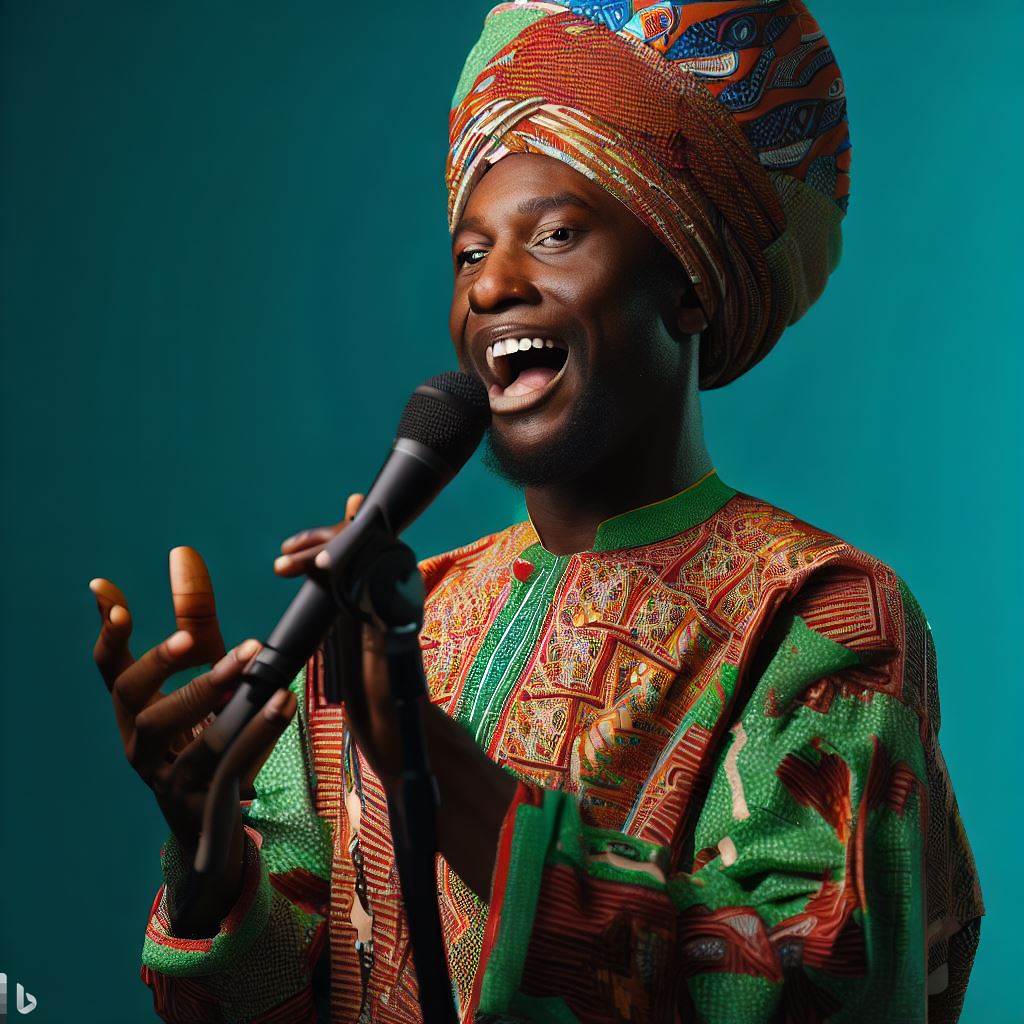Introduction
In this blog post, we will explore the captivating history and evolution of music in Nigeria.
Nigerian music has had a profound impact on a global scale, influencing various genres and artists worldwide.
The purpose of this blog post is to delve into the rich musical heritage of Nigeria, tracing its roots, examining its growth and transformation, and exploring its significance in today’s music industry.
Traditional Nigerian Music
Traditional Nigerian music has a rich history that dates back centuries.
It is deeply rooted in the culture and traditions of the indigenous people of Nigeria.
The diverse musical traditions of various ethnic groups in Nigeria highlight the cultural importance of music in Nigerian traditional societies.
The Rich History of Indigenous Nigerian Music
- Indigenous Nigerian music has been passed down through generations, serving as a means of communication and cultural preservation.
- Traditional music in Nigeria has its origins in ancient times, with the use of instruments such as drums, flutes, and stringed instruments.
- Oral traditions play a significant role in the preservation and transmission of indigenous Nigerian music, ensuring its continuity.
Diverse Musical Traditions of Various Ethnic Groups in Nigeria
- Nigeria is home to over 250 ethnic groups, each with its unique musical traditions and styles.
- The Hausa people have a rich musical heritage, known for their traditional instruments like the “goge” and “kakaki.”
- The Yoruba people are famed for their intricate drumming techniques and use of the “bata” drum in their traditional music.
- The Igbo people are known for their vibrant masquerade festivals, accompanied by the sounds of “ogene” and “ekwe” instruments.
- Other ethnic groups like the Ibibio, Efik, and Tiv also have distinct musical styles and instruments.
The Cultural Importance of Music in Nigerian Traditional Societies
- Music plays a vital role in various aspects of Nigerian traditional societies, including religious ceremonies, festivals, and rites of passage.
- Traditional music serves as a medium to express emotions, convey messages, and tell stories about the history and cultural heritage of the Nigerian people.
- It fosters a sense of community and strengthens social bonds, promoting unity and cooperation among community members.
- Nigerian traditional music often accompanies dance performances, adding rhythm and energy to the celebrations and rituals.
In fact, traditional Nigerian music has a deep-rooted history and significance in Nigerian society.
It showcases the diverse musical traditions of different ethnic groups, highlighting the cultural richness and diversity of Nigeria.
Through its various forms and styles, traditional music in Nigeria continues to be an integral part of cultural expression and societal cohesion.
Read: How to Become a Successful Artists’ Agent in Nigeria
Early Influences on Nigerian Music
In the early years, Nigerian music was heavily influenced by colonialism.
The introduction of Western musical elements to Nigeria had a profound impact on the country’s music scene.
Traditional Nigerian music began to blend with Western influences, creating a unique and rich musical tradition.
Impact of Colonialism on Nigerian Music
- Colonialism brought foreign cultural practices to Nigeria, including Western music.
- Christian missionaries played a significant role in introducing Western music to Nigeria.
- Traditional Nigerian music was often suppressed by colonial authorities.
- Colonial rule led to the decline of certain traditional Nigerian musical practices.
- Despite the negative impact, colonialism also created opportunities for Nigerian musicians to learn Western music.
Introduction of Western Musical Elements to Nigeria
- Western musical instruments such as the piano, guitar, and trumpet were introduced to Nigeria.
- Western music notation and composition techniques were taught in schools and churches.
- Brass bands became popular, showcasing Western musical styles and instruments.
- Western hymns and songs were translated into local Nigerian languages.
- The introduction of Western musical elements broadened the scope of Nigerian music.
Blending of Traditional and Western Influences in Early Nigerian Music
- Nigerian musicians began incorporating Western instruments into traditional music performances.
- Traditional Nigerian rhythms and melodies were fused with Western harmonies.
- Vocal styles from traditional music were adapted to fit Western musical structures.
- Traditional Nigerian percussion instruments, such as the talking drum, were combined with Western drums.
- The blending of traditional and Western influences resulted in a unique hybrid music style.
Early Nigerian music was a product of the colonial era, with both positive and negative effects.
The introduction of Western musical elements expanded the range of musical expression in Nigeria and created opportunities for Nigerian musicians to learn new techniques and styles.
However, colonialism also had a detrimental impact on traditional Nigerian music, leading to its suppression and decline in certain areas.
Despite these challenges, Nigerian musicians managed to blend traditional and Western influences, creating a distinctive musical tradition that continues to evolve.
The integration of Western instruments, harmonies, and composition techniques with traditional rhythms, melodies, and vocal styles resulted in a vibrant and diverse music scene.
Today, Nigerian music is known for its fusion of different genres, including Afrobeat, Highlife, Juju, and Afro-pop. These genres showcase the rich history and evolution of music in Nigeria.
Read: Steps to Becoming a Successful Music Publisher in Nigeria
Emergence of Highlife Music
Highlife music, a genre that originated in Ghana, emerged in Nigeria during the 20th century.
It was characterized by a fusion of Ghanaian and Nigerian music, resulting in a unique sound that captivated audiences.
The emergence of highlife music in Nigeria in the 20th century
The development of highlife music in Nigeria can be traced back to the early 1900s when Ghanaian musicians migrated to Nigeria.
They brought with them their traditional rhythmic patterns and melodies, which eventually blended with Nigerian musical elements.
The fusion of Ghanaian and Nigerian music in the development of highlife
One of the key factors behind the popularity of highlife music was its ability to appeal to both the elites and the masses.
It had elements of Western music, such as jazz and swing, while also incorporating African rhythms and melodies. This fusion created a sound that was both sophisticated and accessible.
Highlife music gained momentum in the 1930s with the introduction of modern instruments like the guitar, trumpet, saxophone, and drums.
These instruments added a distinct flavor to the music, making it more vibrant and energetic.
Key highlife artists and their contributions
Several Nigerian musicians played a crucial role in shaping the highlife genre. One of them was E.T. Mensah, a Ghanaian musician who relocated to Nigeria in the 1940s.
He is often referred to as the “King of Highlife” and his band, The Tempos, became one of the most influential highlife bands in West Africa.
Another notable figure in the development of highlife music was Bobby Benson. He was a Nigerian musician who blended elements of jazz and highlife, creating a unique style that resonated with audiences.
Benson’s band, Bobby Benson and His Jam Session Orchestra, became famous for their energetic performances and catchy melodies.
Other key highlife artists include Victor Olaiya, Rex Lawson, and Sir Victor Uwaifo.
Each of these musicians made significant contributions to the genre, either through their innovative compositions or their exceptional performances.
Highlife music continued to evolve throughout the 20th century, incorporating influences from various genres.
It reached its peak of popularity in the 1950s and 1960s, with highlife bands performing in clubs, dance halls, and even on national radio stations.
However, with the rise of other genres like Afrobeat and juju music in the 1970s, highlife music began to decline in popularity.
In essence, the emergence of highlife music in Nigeria in the 20th century was a result of the fusion between Ghanaian and Nigerian music.
It captivated audiences with its unique blend of Western and African influences and played a vital role in shaping the Nigerian music scene.
Artists like E.T. Mensah, Bobby Benson, Victor Olaiya, Rex Lawson, and Sir Victor Uwaifo made significant contributions to the genre, leaving a lasting legacy.
Read: Creating a Winning Demo Reel for Voice Actors in Nigeria

The Rise of Juju Music
Juju music, a popular genre in Nigeria during the mid-20th century, emerged as a unique fusion of traditional Yoruba music and modern influences.
It was a significant development in the history and evolution of Nigerian music.
Popularity of Juju Music in the Mid-20th Century
- The 1940s and 1950s witnessed the rise of juju music as a dominant genre in Nigeria.
- This popularity can be attributed to the energetic and danceable nature of juju music.
- The catchy melodies, pulsating rhythms, and infectious beats of juju music captivated audiences across the country.
- During the mid-20th century, juju music became the soundtrack of celebrations, parties, and social gatherings.
- Its popularity extended beyond Nigeria, gaining recognition and acclaim in neighboring West African countries.
- Well-known juju bands toured extensively, bringing the euphoria and joy of the music to different cities and towns.
- Record sales soared, and juju music dominated the airwaves, further cementing its place in Nigerian music culture.
Influence of Traditional Yoruba Music on Juju Music
Juju music draws heavily from its roots in traditional Yoruba music, incorporating various elements to create its distinctive sound.
- Traditional Yoruba rhythms, such as apala, bata, and sakara, form the foundation of juju music.
- The talking drum, a key instrument in Yoruba music, plays a prominent role in juju music arrangements.
- Juju musicians often sing in Yoruba, preserving the cultural and linguistic identity of the music.
- The use of call-and-response vocal patterns, characteristic of Yoruba music, adds an interactive and participatory aspect to juju performances.
- Traditional Yoruba instruments like the sekere, agidigbo, and shekere are also featured in juju music compositions.
Key Juju Music Artists and Their Impact on Nigerian Music
Several legendary artists have contributed to the growth and development of juju music in Nigeria, leaving an indelible mark on the country’s music history.
- Chief Commander Ebenezer Obey, popularly known as “Obey,” played a pivotal role in popularizing juju music.
- His unique guitar style, captivating vocals, and socially conscious lyrics resonated with audiences.
- King Sunny Ade, another iconic figure in Nigerian music, revolutionized juju music by introducing modern electric instruments.
- With his band, the African Beats, King Sunny Ade became a global ambassador of juju music.
- Dr. Orlando Owoh, known for his distinct vocal delivery and mastery of various Yoruba music styles, contributed immensely to the evolution of juju music.
- Other notable juju musicians include Shina Peters, Segun Adewale, and Sir Shina Adewale.
- The influence of these artists transcends juju music, inspiring subsequent generations of Nigerian musicians.
Basically, the rise of juju music in Nigeria during the mid-20th century showcased the country’s rich musical heritage and its ability to adapt and evolve.
By blending traditional Yoruba music with contemporary influences, juju music captivated audiences and became an integral part of Nigerian music culture.
The contributions of legendary juju music artists continue to resonate and shape the Nigerian music landscape.
Read: Emerging Trends in Music Publishing in Nigeria
Gain More Insights: Emerging Trends in Nigeria’s Animation Industry
Afrobeat and Fela Kuti
Afrobeat music emerged in Nigeria in the 1970s, gaining popularity both locally and globally.
Fela Kuti played a significant role in popularizing this genre, while also conveying powerful political and social messages through his music.
- Emergence of Afrobeat: In the 1970s, Nigeria experienced a musical revolution with the emergence of Afrobeat.
- Fusion of Styles: Afrobeat blended traditional Nigerian music with jazz, highlife, funk, and Western influences.
- Influences: Fela Kuti, the pioneer of Afrobeat, drew inspiration from James Brown, Miles Davis, and traditional Nigerian rhythms.
- Fela Kuti’s Contribution: Fela Kuti’s innovative sound and charismatic personality played a vital role in popularizing Afrobeat.
- Unique Sound: Afrobeat’s distinct sound was characterized by complex polyrhythms, powerful horn sections, and prominent bass lines.
- Political and Social Commentary: Fela Kuti used Afrobeat as a platform for expressing political and social messages.
- Fela’s Activism: Fela Kuti was an outspoken critic of Nigeria’s corrupt government and advocated for human rights and social justice.
- International Recognition: Fela’s powerful lyrics and energetic performances resonated globally, earning him international acclaim.
- Musical Structure: Afrobeat songs typically consisted of long instrumental introductions, followed by Fela’s poetic lyrics in Pidgin English.
- Conscious Lyrics: Fela’s songs addressed issues such as government oppression, poverty, and the exploitation of the Nigerian people.
- Impact of Afrobeat: Afrobeat became a symbol of resistance and cultural pride for many Nigerians and Africans worldwide.
- Influence on Future Generations: Fela Kuti’s Afrobeat laid the foundation for future genres like Afrofunk, Afrobeats, and Nigerian pop music.
- Legacy: Fela Kuti’s legacy as a musical and political icon continues to inspire artists and activists globally.
- Recognition and Honors: Fela received numerous awards posthumously, including induction into the Rock and Roll Hall of Fame.
Modern Nigerian Music
In the last few decades, Nigerian music has undergone a remarkable evolution, reflecting the country’s diverse cultural heritage and global influences.
This evolution has given rise to a wide range of exciting genres and sub-genres, which have left an indelible mark on the global music industry.
Evolution of Nigerian Music
- Traditional Nigerian music has evolved to incorporate contemporary elements.
- New musical styles, such as afrobeat, afropop, and highlife, emerged in the late 20th century.
- Nigerian artists began infusing their music with Western influences, creating a fusion of styles.
- Advancements in technology, such as the proliferation of recording studios, contributed to the growth of Nigerian music.
- The emergence of music videos and the internet further propelled the popularity of Nigerian music.
Genres and Sub-genres
Modern Nigerian music encompasses an array of genres and sub-genres, offering something for every musical taste.
Some notable genres include:
- Afrobeat: Combines traditional Nigerian rhythms with elements of jazz, funk, and highlife.
- Afropop: Blends African beats with Western pop music, creating a catchy and danceable sound.
- Highlife: Originating from Ghana, this genre became popular in Nigeria, characterized by upbeat melodies and brass instruments.
- Juju: A Yoruba music style that incorporates elements of traditional percussion, guitar, and talking drums.
- Naija hip-hop: Nigerian artists fuse hip-hop with Nigerian rhythms and lyrics, creating a distinct style.
Influence on the Global Music Industry
Nigerian music has had a significant impact on the global music industry, elevating the country’s cultural presence and attracting international recognition.
Here are some ways Nigerian music has influenced the global scene:
- Afrobeats, a contemporary fusion of African music styles, gained popularity worldwide, with Nigerian artists at the forefront.
- Nigerian music festivals, such as the Lagos Music Festival, have attracted international performers and music enthusiasts.
- Artists like Fela Kuti, King Sunny Ade, and Burna Boy have garnered global acclaim and influenced musicians across the globe.
- Nigerian musicians collaborated with international artists, promoting cultural exchange and diversifying music styles.
- The vibrant Nigerian music industry has become a source of inspiration and a reference point for creativity in global music.
All in all, modern Nigerian music has experienced a dynamic evolution, showcasing the country’s rich cultural heritage and embracing global influences.
With its diverse genres and sub-genres, Nigerian music continues to captivate audiences worldwide and shape the global music industry.
Conclusion
This blog post has provided an insight into the history and evolution of music in Nigeria.
We have seen how Nigerian music has evolved from traditional sounds to incorporate various genres like Highlife, Juju, Afrobeat, and contemporary Afrobeats.
The significance of Nigerian music’s history and evolution cannot be overstated. It is not just a form of entertainment but also a reflection of the rich cultural heritage and identity of the Nigerian people.
Nigerian music has transcended borders and gained global recognition, showcasing the talent and creativity of Nigerian artists.
As readers, it is important for us to explore and appreciate Nigerian music. By doing so, we not only connect with the vibrant sounds and rhythms but also support and promote Nigerian musicians on a global platform.
Nigerian music has the power to inspire, uplift, and unite people from diverse backgrounds, fostering cultural exchange and understanding.
So, let us delve deeper into the world of Nigerian music, listen to the melodies, and dance to the beats.
Let us appreciate the history and evolution of Nigerian music as a testament to the resilience and creativity of the Nigerian people.
Nigerian music has a story to tell, and it is up to us to listen and celebrate its greatness.




